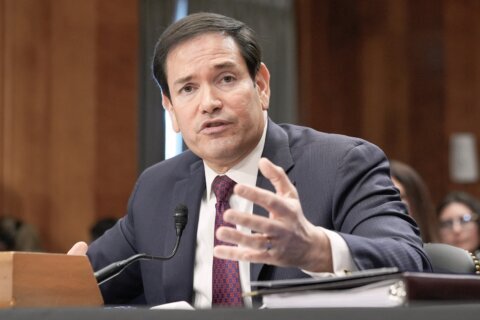VERSAILLES, France (AP) — Flexing his diplomatic muscles, French President Emmanuel Macron said he had “extremely frank, direct” talks with Russian President Vladimir Putin on Monday, pushing for cooperation on Syria and against the Islamic State group but also launching an extraordinary attack on two Russian media outlets he accused of spreading “lying propaganda.”
The two leaders emerged from their first meeting — discussions at the sumptuous Palace of Versailles that lasted more than an hour longer than planned — clearly still at odds on multiple issues, but also seemingly keen not to let their differences define their fledgling relationship.
Macron said he spoke to Putin about LGBT rights in Chechnya and about the rights of embattled NGOs in Russia, vowing he would be “constantly vigilant” on these issues. Putin emphasized the need for closer cooperation between Russia and France, two nuclear-armed permanent members of the U.N. Security Council.
Speaking with remarkable frankness, Macron tore into the state-funded Russian media outlets Sputnik and Russia Today, for spreading what he said were “serious untruths” during the French election.
“When press outlets spread defamatory untruths, they are no longer journalists, they are organs of influence. Russia Today and Sputnik were organs of influence during this campaign, which, on several occasions produced untruths about me and my campaign,” Macron said.
“I will not give an inch on this,” he said. “Russia Today and Sputnik … behaved as organs of influence, of propaganda, of lying propaganda.”
Macron was the first Western leader to speak to Putin after the Group of Seven summit over the weekend, where relations with Russia were a key topic.
His invitation to the Russia leader was a surprise after the tough stance on Russia Macron took during the French election. Macron’s aides also claimed that Russian groups launched hacking attacks on his campaign.
Moscow strongly denied all allegations of meddling in the French election that Macron won on May 7. Putin on Monday again poo-pooed the idea as unfounded press speculation.
But he also defended his March meeting with Macron’s rival in the presidential race, far-right leader Marine Le Pen.
Putin described Le Pen as a politician who wants to develop friendly ties with Russia and said it would have been strange to rebuff her overtures.
He said the meeting with Le Pen didn’t represent an attempt to sway the race. Putin added that Russia had been well-aware of opinion polls predicting Macron’s victory.
Macron said he was firm on other issues, too.
He said any use of chemical weapons in Syria — where Russia is propping up the government of President Bashar Assad — is a “red line” for France and would be met by “reprisals” and an “immediate riposte” from France.
He did not specify what form such reprisals could take, but France flies warplanes over Syria and Iraq, striking Islamic State targets as part of an international coalition.
Macron portrayed the meeting as just a first step in resetting the country’s relations with Russia.
“Big things are built over time,” he said. “It was an exchange that was extremely frank, direct, with a lot of things that were said.”
“We have disagreements, but at least we talked about them,” he added.
The leaders’ first handshakes — relatively brief and cordial — after Putin climbed out of his limousine at Versailles were far less macho than Macron’s now famous who-will-blink-first handshake showdown with President Donald Trump when the two leaders met for the first time last week.
Putin said he and Macron agreed to discuss pursuing closer cooperation on anti-terror efforts, with a proposed exchange of experts to work toward that goal.
On Syria, Putin underlined the importance of securing the Syrian state, adding that it’s essential for combatting terrorism. Macron took the same stance, saying: “I want us to organize a democratic transition but also preserve a Syrian state.”
“Failed states in that region are a threat for our democracies,” and fuel terrorism, he said.
Later Monday, Putin was visiting a newly built Russian Orthodox Spiritual and Cultural Center near the Seine River that includes the Holy Trinity Cathedral. The site was sold to Russia under former President Nicolas Sarkozy amid criticism from human rights groups.
Ostensibly, the reason for Putin’s visit was for him to tour an exhibition in Versailles about the 300th anniversary of Russian Czar Peter the Great’s trip to Paris. But it became an opportunity for him and Macron to go over all the thorny issues that divide them, and see where they have common ground.
Human rights activists protested Monday in Paris over the situation of gays in the Russian republic of Chechnya, holding a banner “Stop homophobia in Chechnya” near the Eiffel Tower.
The Macron-Putin relationship got off to a less-than-ideal footing during Macron’s presidential campaign.
Macron had strong words for Russia in his race for the presidency, saying France and Russia don’t share the same values. Putin bet — wrongly — on Macron’s far-right opponent Marine Le Pen, hosting her at the Kremlin in March, before Macron then handily beat her.
___
Leicester contributed from Paris.
Copyright © 2026 The Associated Press. All rights reserved. This material may not be published, broadcast, written or redistributed.






